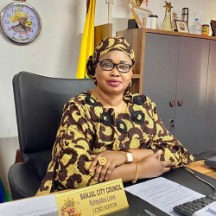Despite winning the mayoral seat in Banjul, Rohey Malick Lowe still recalled the bullying, stereotypes, and the “pull her down syndrome” she went through during her campaign for election to the mayoral seat.
The “pull her down syndrome,” also referred to as the “PHD,” is a term that refers to the act of women bringing each other down. More generally, women castigate and mudsling other women who are striving for representation or success in a male dominated world, instead of standing by and supporting their fellow women.
Lowe said the insults and harassment that were directed at her made her strong and strengthened her resolve to become the first female mayor of Banjul, Gambia’s capital city. Mayor Lowe was a successful businessperson before travelling to Switzerland where she did her studies.
These challenges and other major obstacles are what women face in their attempt at full political participation. According to studies, it is a complex issue as it can be traced back to a number of institutional, historical, socio-economic as well as cultural factors. Household responsibilities, low self-esteem, illiteracy, few role models, and lower expectations were also found as the key reasons that stop women from participating in politics.
Financial Constraints
But it is not only about the lack of support from fellow women that is militating against their political participation and chance at holding decision-making positions, a lack of finance is also a problem.
In the 2018 local government election, Ndumbeh Sallah of the Gambia Democratic Congress contested against three men for the Sabiji ward councillorship seat under the Latrikunda Sabiji constituency. She lost after securing only 444 votes out of a total number of votes of 3307.
“One of my biggest challenges during the campaign was financial constraints, a lack of a proper campaign team, and mobilisation techniques,” she said.
For that election, Sallah was all by herself, with no coaching or mentor to tell her what to do or not to do and how she could win the minds of voters. This needs to change, she said.
"There should be enough advocacy for both women and men, to change the mentality of cultural and traditional beliefs about women because Gambian women are determined,” she said. “I think if we have proper advocacy, at least, we would have equal representation for women."
For the fact that she was the only female contesting in the ward, she complained that she was also bullied and harassed by her male opponents as well as her fellow women during the process.
“They were seeing me as someone who did not know what to do because for them they thought that women can’t hold a political position. I also received a lot of insults from them, especially on social media,” she recalled.
Sallah was not the only female candidate who faced financial constraints, a sign that political parties are not financially supporting women candidates as they would for the men.
Women must support women
Fatou Janneh ran on a PDOIS ticket for the Kunkujang Keitaya ward in the Old Yundum constituency during the councillorship election. Janneh,who lost with 9.06% of the votes, said her party sponsored her, but the funds were "‘not enough." But she is still determined to contest again.
“When I lost, I just took it in good faith and know that there is always a chance and hope for continuity. It motivated me to stand firm in politics and ready to tackle the coming challenges and strategize ways to win the coming elections,” she said.
However, Janneh said women must support their fellow women if they want to achieve equal representation and to hold places in decision-making processes.
Despite women representing a larger percent of the electorates; their numerical strength has not, however, been reflected in the number of women in governance and leadership positions at both national and local levels.
For twenty years, only three pro-women laws have been passed by the National Assembly- the Women’s Act of 2010, the Domestic Violence Act 2013, and the Sexual Offences Act 2013. Yet, women remain politically marginalised.
Political Parties Exploit Women
Activist Tabu Njie-Sarr blames the low representation of women in the political arena on patriarchal society.
“We live in a patriarchal society. Socio-cultural barriers do not encourage women to lead,” she said. Njie-Sarr, who is also the coordinator of the CSO Gender Platform, said that “violence or threats of violence often serve as obstacles to women’s political participation. Such violence takes a variety of forms including character defamation, harassment, insults, sexual violence, and assault.”
She added that there is a need for proactive laws that will ensure women are well represented in decision-making processes.
“Even in political parties, women are exploited because they’re only relegated to cooking, clapping, and dancing and we see this as exploitation because by the time decisions are made these women are already tired [and would not even have a seat on the table],” she observed.
She also called for affirmative actions through the National Assembly and political parties to ensure a 30% quota system for women representation.
The Gambia has not introduced the quota system in meeting the 30 per cent target for women’s political participation and representation in the National Assembly and public positions respectively in line with the African Union Solemn Declaration.
This becomes more relevant in the political arena and decision-making at all levels, where women are not legally barred from participating effectively on an equal footing with men, but may not be able to do so due to cultural biases in favour of men, and stereotypical perception of the role of women - as noted in the 2012 study on Women’s Political Participation and Representation in The Gambia.
In the 2017 elections for the National Assembly, 53 seats were up for grab, and all went to the men except three for women. One was returned unopposed and three others were nominated. Female representation in the National Assembly is less than 11 % and falls far below the 50% and 30% recommended by the Inter-Parliamentary Union and the Convention on the Elimination of all forms of Discrimination Against Women (CEDAW).
Inclusive decision-making processes
The Gambia domesticated the CEDAW, which it ratified in 1993, into a Women’s Law in 2010, and ratified the Maputo Protocol (...on the Rights of Women in Africa). However, women have yet to fully realise the political rights provided by these instruments.
At the cabinet level, there are only four women among 23 ministers. The challenge of inequality in politics does not stop there; it runs down to the local leadership level where women constitute only eight out of the 120 councillors in the country.
Essa Njie, a political science lecturer at the University of The Gambia, said women’s participation is important in many ways because “it promotes inclusive decision-making processes.” He added participation in decision-making is also a form of empowering women.
He said for there to be equal representation, the laws should be strengthened and provide the legal framework that would allow equal representation for women. This should start with the Constitution and the Women’s Act, which would lead to affirmative actions.
“We need a quota system in the Constitution which would allow political parties to put certain percentages of women when it comes to decision-making processes like the parliamentary and local government elections,” Njie suggested.
Media Academy for Journalism and Communication is a not-for-profit established by the Gambia Press Union to strengthen democracy through professional training for media and communication specialists. Their journalism programme is aligned to the UNESCO standards for journalism education in Africa and it is accredited by the National Accreditation and Quality Assurance Authority.








